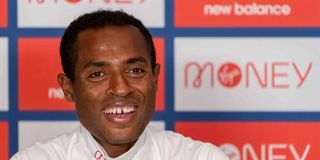Premium
Ethiopia's 'town of runners' tries to outpace Covid-19 pandemic
What you need to know:
- Fatiya Abdi, who coaches Hanna and around 40 other girls in Bekoji through an organisation called Girls Gotta Run, hopes the event will shake her athletes out of their pandemic funk.
- In September Prime Minister Abiy Ahmed's government declined to renew Ethiopia's state of emergency, meaning group training could resume.
- In normal times, runners in Bekoji spend each morning transforming the town's eucalyptus forests into a sprawling training ground.
Bekoji, Ethiopia
Just eight months ago, 16-year-old Hanna Awugichew believed she was well on her way to becoming Ethiopia's next elite runner, having qualified for a national competition in the 400-metre dash.
But the coronavirus pandemic threw an obstacle in her path, prompting officials to cancel the race and, under a nationwide state of emergency, place restrictions on how athletes could train.
"We had prepared for the competition and trained well, but we couldn't compete because of coronavirus, and that was very disappointing," said Hanna, adding she had been "very excited to win".
It's a common story in Bekoji, a town 225 kilometres (140 miles) south of the capital Addis Ababa that is renowned for producing running stars who have collectively bagged some 18 Olympic medals.

A handout picture released by the the London Marathon on September 30, 2020 shows Ethiopia's Kenenisa Bekele (left) and Kenya's Eliud Kipchoge speaking to the media via Zoom in a virtual and socially distanced press conference from inside the official hotel and biosecure bubble for the historic elite-only 2020 Virgin Money London Marathon to be held on 4th October.
On Sunday, Bekoji's favourite son, five-time world champion Kenenisa Bekele -- himself winner of three Olympic golds, will face off against Kenyan icon and marathon world record-holder Eliud Kipchoge in the London Marathon.
Fatiya Abdi, who coaches Hanna and around 40 other girls in Bekoji through an organisation called Girls Gotta Run, hopes the event will shake her athletes out of their pandemic funk.
"The race in which Kenenisa will compete will motivate the townspeople and the athletes," Fatiya said.
"It will encourage our athletes to work hard and motivate them to prepare for their own competitions."
The marathon is the latest sign of a return to normalcy for Bekoji's runners after pandemic-related disruptions.
For much of this year, hundreds of youngsters in Bekoji vying to emulate the town's stars -- household names like Derartu Tulu, Fatuma Roba and Tirunesh Dibaba -- have seen their dreams put on hold.
But in September Prime Minister Abiy Ahmed's government declined to renew Ethiopia's state of emergency, meaning group training could resume.
Training solo
In normal times, runners in Bekoji spend each morning transforming the town's eucalyptus forests into a sprawling training ground.
As women gathering kindling look on, the athletes weave through the trees while their coaches take them through high knees, straight-leg bounds and other drills.
But this hallowed terrain where Bekele started training as a teenager sat largely empty after Ethiopia recorded its first Covid-19 case in mid-March.
"When Covid showed up we thought it would be over within one week or two weeks. When the cases started to increase is when we started worrying," Fatiya said.
Fatiya did her best to ensure her athletes' training regimens wouldn't be completely derailed.
Though she could no longer meet with them in person, she drew up individual programmes and kept in touch with them by phone.
"I told them that coronavirus is a killer, but we shouldn't be neglectful of our training. We have to defeat the virus with our relentless effort," she said.
The changes brought challenges, said 17-year-old Sada Adem, who qualified for nationals this year in the 1,500-metre competition.
Fatiya's phone calls were helpful, Sada said, but they were "not the same" as in-person instruction that allows a coach to correct problems with form as soon as they arise.
Sada also missed running with her friends.
"When you train as a group, you compete with your teammates and you get encouraged," she said.
Bekele's corner
Bekoji's distance-running prowess is legendary and was even the focus of an award-winning 2012 documentary by Jerry Rothwell titled "Town of Runners".

A handout picture released by the the London Marathon on September 30, 2020 shows Ethiopia's Kenenisa Bekele speaking to the media via Zoom in a virtual and socially distanced press conference from inside the official hotel and biosecure bubble for the historic elite-only 2020 Virgin Money London Marathon to be held on 4th October.
Yet residents struggle to pinpoint the reasons for the town's success, suggesting it could be due to the altitude -- which tops 2,800 metres (9,200 feet) -- or perhaps a local diet rich in wheat and sorghum.
These conditions, however, are hardly unique in Ethiopia, a distance-runner's dreamland with no shortage of high-altitude routes.
Another explanation, at least for the town's younger runners, is a desire to follow the lead of those who have already achieved fame.
That's why coaches like Fatiya are so eager to see the resumption of high-profile events like the London Marathon after a months-long hiatus.
Anticipation for Sunday's race extends beyond Bekoji's running community.
It will also likely mean big business at Tola Cafe, one of just two places in town offering satellite television so patrons can watch live.
Zeray Eshetu, a waiter at Tola, said he expected electric energy during Sunday's face-off between Bekele and Kipchoge.
"People become really emotional when an Ethiopian athlete wins the competition. They clap, they jump, they shout, they take off their shirts and spin them around," he said.
Bekele faces tough odds against Kipchoge, who has won the London Marathon four times.
But Hanna, the 16-year-old aspiring 400-metres star, said she believed Bekoji's hometown hero would triumph.
"In this race, our athlete Kenenisa will win," she said. "I say this with full confidence."




